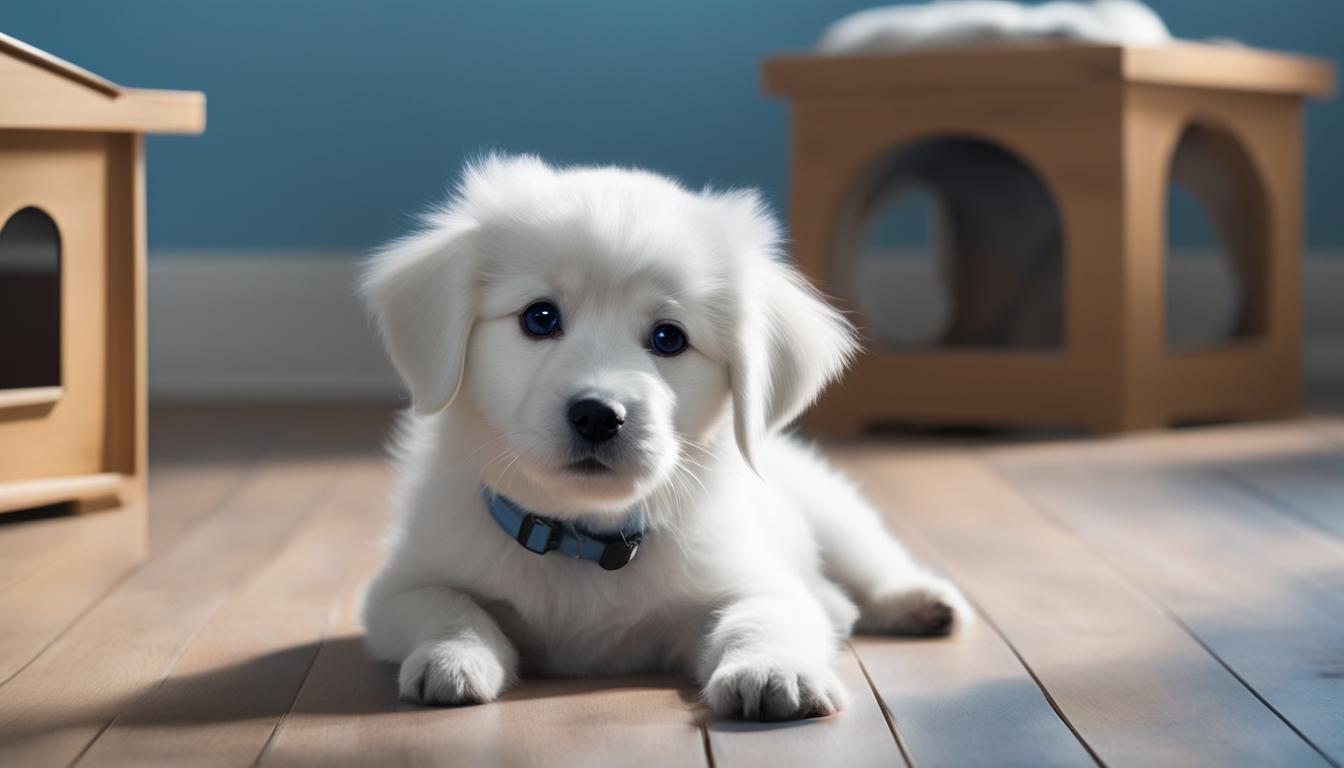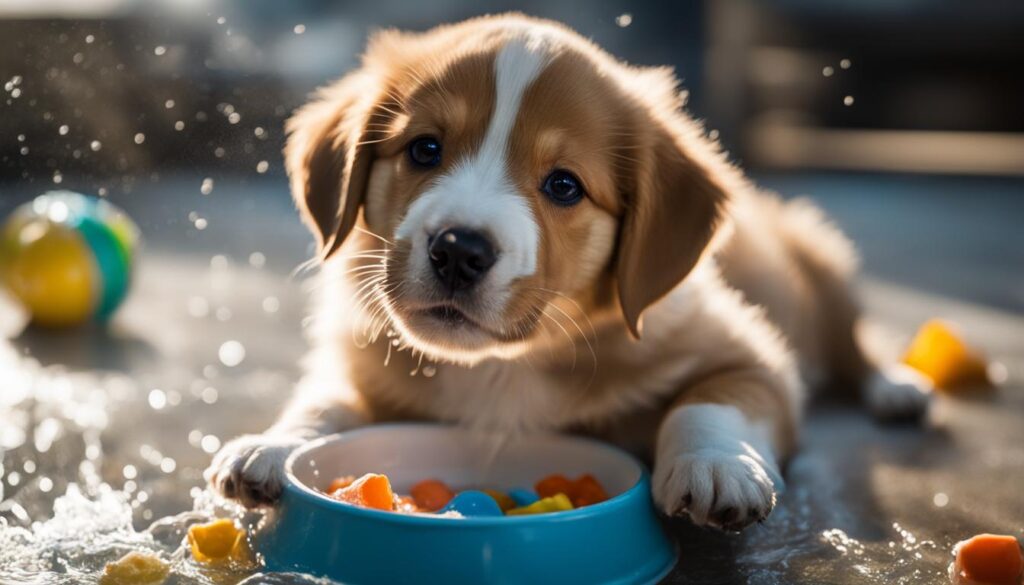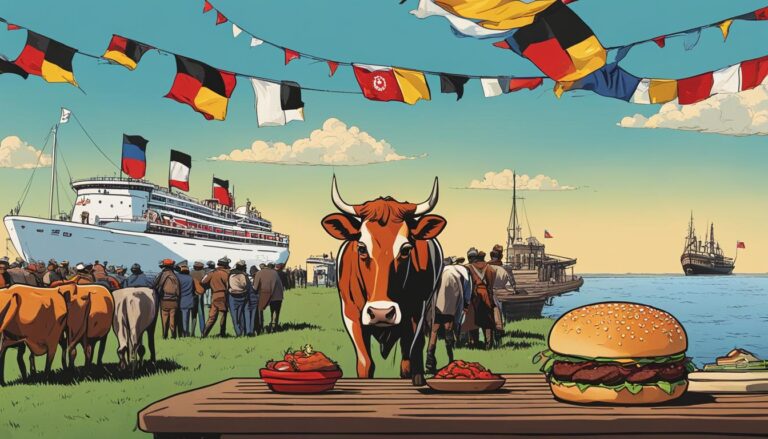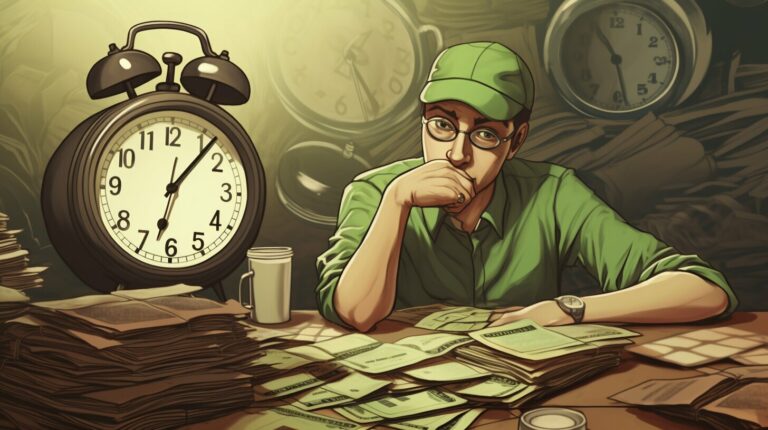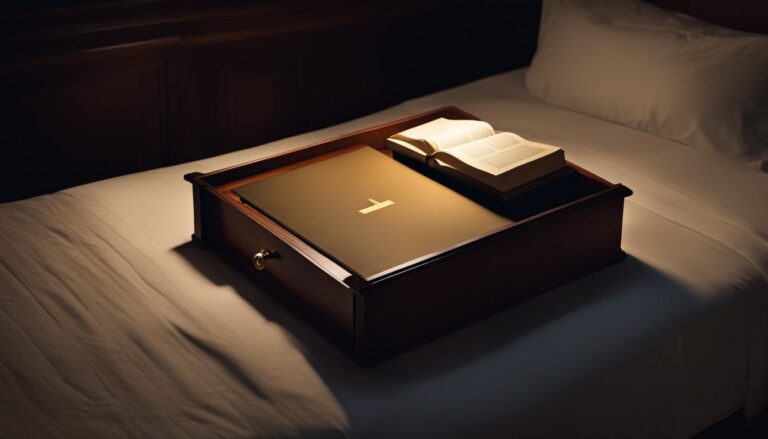Unraveling the Mystery: Why Do Puppies Get Hiccups?
Have you ever wondered why puppies get hiccups, just like humans do? It’s a common occurrence that can leave us puzzled, but fear not, I’m here to shed some light on this adorable phenomenon. Puppies, with their tiny bodies and curious nature, can often experience hiccups due to various reasons. Let’s dive into the fascinating world of puppy hiccups and uncover the causes behind them.
Key Takeaways:
- Puppies can get hiccups just like humans do.
- The diaphragm muscle in puppies can contract involuntarily and cause hiccups.
- Rapid eating or drinking, excitement or stress, temperature changes, and overeating can trigger hiccups in puppies.
- Understanding the causes of puppy hiccups can help us provide the necessary care and attention.
- If hiccups become frequent or are accompanied by concerning symptoms, it’s important to consult a veterinarian.
The Immature Diaphragm and Hiccups in Puppies
Puppies are adorable and bring joy to our lives, but they can also experience hiccups just like humans do. The immature diaphragm in young dogs plays a significant role in why they get hiccups more frequently compared to adult dogs. As their diaphragm is still developing, it can experience spasms or irregular contractions, leading to those cute but sometimes bothersome hiccups.
When dealing with puppy hiccups, it’s important to create a soothing environment to help them feel at ease during these episodes. Remember to stay calm and provide gentle reassurance. Sometimes a little distraction, like engaging in play or providing a toy, can help interrupt the hiccup cycle and alleviate their discomfort.
Understanding the connection between the immature diaphragm and puppy hiccups can help us better care for our furry friends. By offering a nurturing environment and providing comfort, we can ensure their well-being as they grow and develop.
Table: Comparison of Diaphragm Development in Puppies and Adult Dogs
| Development Stage | Puppies | Adult Dogs |
|---|---|---|
| Diaphragm Maturity | Immature | Fully developed |
| Contraction Regularity | Spasms or irregular contractions | Regular contractions |
| Hiccup Frequency | More frequent | Less frequent |
Just like humans, puppies can get hiccups. The immature diaphragm in young dogs is still developing, which can lead to spasms or irregular contractions and result in hiccups. Providing a calm and reassuring environment can help soothe them during these episodes.
Rapid Eating and Drinking as a Cause of Puppy Hiccups
One common cause of hiccups in puppies is rapid eating or drinking. Puppies are known for their enthusiasm when it comes to mealtime, and this eagerness can lead to hiccups. When puppies consume their food or water too quickly, it can cause their diaphragm to contract and result in hiccups.
To prevent hiccups caused by rapid eating or drinking, it is important to feed puppies slowly and in smaller portions. This allows them to eat at a more relaxed pace and reduces the likelihood of the diaphragm contracting abruptly. Some techniques that can help slow down their eating include using puzzle feeders or feeding them smaller meals throughout the day.
In addition to preventing hiccups, slowing down their eating can also benefit their digestion. Eating too quickly can lead to indigestion or even choking, so it is essential to create a calm and controlled feeding environment for puppies.
The Benefits of Slow Feeding
Slow feeding not only helps prevent hiccups in puppies, but it also has several other benefits. By slowing down their eating, puppies are less likely to experience bloating or gastric torsion, which can be life-threatening conditions. This is particularly important for deep-chested breeds that are prone to these issues.
Furthermore, slow feeding can help with weight management. When puppies eat too quickly, they may not feel satisfied and may end up overeating. By giving them smaller, more frequent meals, they are less likely to become overweight or obese.
| Benefits of Slow Feeding: |
|---|
| Prevents hiccups |
| Reduces the risk of bloating and gastric torsion |
| Aids in weight management |
So, if your puppy tends to get hiccups after meals, consider implementing slow feeding techniques. Not only will it help prevent hiccups, but it will also promote healthier eating habits and overall well-being for your furry friend.
Excitement and Stress as Triggers for Puppy Hiccups
While hiccups in puppies are often harmless, they can be triggered by excitement and stress. Just like humans, puppies can experience involuntary contractions of the diaphragm when they’re feeling excited or anxious, leading to hiccups. It’s important to provide a calm and soothing environment for your puppy to help alleviate these hiccups.
Creating a peaceful atmosphere can help reduce your puppy’s stress levels and minimize the occurrence of hiccups. Avoid loud noises, sudden movements, or overwhelming situations that can cause your puppy to become overly excited or anxious. Instead, offer gentle distractions such as soft toys or soothing music to help redirect their focus and promote a sense of calmness.
If your puppy is prone to hiccups during specific activities, such as when meeting new people or going to the vet, it may be helpful to gradually expose them to these situations. By gradually introducing your puppy to new experiences and socialization, you can help them become more comfortable and reduce their stress levels, thus decreasing the likelihood of hiccups.
Remember, hiccups in puppies are typically temporary and will resolve on their own. However, if the hiccups persist or are accompanied by other concerning symptoms, it’s always a good idea to consult a veterinarian for further guidance and support.
Temperature Changes and Hiccups in Puppies
Sudden temperature changes can contribute to hiccups in puppies. When puppies ingest cold water on a hot day or experience rapid shifts in environmental temperature, it can irritate their diaphragm and trigger hiccups. It’s essential to be aware of these temperature changes and provide a comfortable and stable environment for puppies to minimize the occurrence of hiccups.
Understanding how temperature affects puppies can help us prevent and manage hiccups. During hot days, avoid giving your puppy cold water straight from the refrigerator. Instead, provide room temperature water to prevent sudden temperature changes that may trigger hiccups. Additionally, ensure that your puppy’s living environment is kept at a comfortable temperature to avoid any fluctuations that could potentially irritate their diaphragm.
When taking your puppy outside on a hot day, be mindful of the temperature and avoid exposing them to extreme heat or sudden changes in temperature. Gradual adjustments between indoor and outdoor environments can help minimize the risk of hiccups caused by temperature changes. Taking these precautions can contribute to your puppy’s overall health and well-being.
The Impact of Temperature Changes on Hiccups in Puppies
| Temperature Change | Hiccup Occurrence |
|---|---|
| Sudden shift from hot to cold | High |
| Gradual shift from hot to cold | Low |
As shown in the table above, sudden shifts from hot to cold environments have a higher likelihood of triggering hiccups in puppies. Gradual shifts, on the other hand, have a lower occurrence rate. By being mindful of temperature changes and providing a stable environment for your puppy, you can help reduce the frequency of hiccups and ensure a comfortable experience for your furry friend.
Overeating and Overdrinking as Causes of Puppy Hiccups
Overeating or overdrinking can lead to hiccups in puppies. Puppies who eat or drink too quickly, eat large quantities, or overindulge may experience hiccups due to the excessive intake of food or water. It is important to monitor their food and water intake and establish a feeding routine that includes smaller and more frequent meals to prevent hiccups. Additionally, using slower feeding techniques, such as puzzle feeders or interactive toys, can help puppies eat at a more relaxed pace and reduce the likelihood of hiccups.
When it comes to overdrinking, puppies may gulp down water rapidly, especially when they are thirsty or after engaging in physical activity. This can cause them to swallow excess air, leading to hiccups. To prevent this, it is advisable to provide puppies with small sips of water at regular intervals throughout the day. This not only helps them stay hydrated but also reduces the chances of hiccups caused by rapid drinking.
Managing and preventing hiccups caused by overeating and overdrinking involves monitoring and controlling the puppy’s food and water intake. By establishing a balanced feeding routine and promoting slower eating and drinking habits, we can minimize the occurrence of hiccups in puppies and ensure their overall well-being.
Table: Preventing Hiccups in Puppies
| Causes of Hiccups | Preventive Measures |
|---|---|
| Rapid eating | Feed puppies slowly and in smaller portions |
| Overeating | Monitor food intake and provide smaller, more frequent meals |
| Overdrinking | Offer small sips of water at regular intervals |
By implementing these preventive measures, we can help puppies avoid the discomfort of hiccups caused by overeating and overdrinking. Remember, a healthy and balanced diet, along with controlled food and water intake, is essential for maintaining a happy and hiccup-free puppy.
When to Be Concerned about Puppy Hiccups
Puppy hiccups are typically harmless and resolve on their own. However, there are certain situations where it’s important to be vigilant and seek veterinary attention if necessary. If your puppy’s hiccups become frequent and intense, lasting for extended periods of time, it may indicate an underlying health issue that requires further evaluation.
Additionally, if your puppy experiences hiccups along with other concerning symptoms such as vomiting, coughing, or labored breathing, it’s crucial to consult a veterinarian for a comprehensive examination. These symptoms could be signs of an underlying respiratory or gastrointestinal problem that needs prompt attention and treatment.
Monitoring the duration and frequency of your puppy’s hiccups can help you gauge whether veterinary intervention is necessary. Keep a record of when the hiccups occur, how long they last, and any accompanying symptoms to provide your veterinarian with accurate information during your visit.
Remember, while occasional hiccups are generally nothing to worry about, it’s always better to err on the side of caution and seek medical advice when needed. Your veterinarian is the best resource to assess your puppy’s health and provide guidance on how to alleviate or manage their hiccups.
Managing and Alleviating Puppy Hiccups
When it comes to managing and alleviating hiccups in puppies, there are a few simple techniques that can help. First and foremost, it’s important to stay calm and provide a reassuring environment for your furry friend. Stress and anxiety can exacerbate hiccups, so create a calm and soothing atmosphere to help your puppy relax.
Offering small sips of room-temperature water can also help soothe their throat and potentially relieve hiccups. This can be especially helpful if your puppy is experiencing hiccups after eating or drinking too quickly. Encourage them to take small, slow sips to help break the hiccup cycle.
Distractions can also be effective in interrupting hiccups. Engaging your puppy in gentle play or providing gentle stimulation can redirect their focus and help alleviate the hiccups. The key is to offer a positive distraction that shifts their attention away from the hiccup episode.
Adjusting your puppy’s feeding habits can also minimize the occurrence of hiccups. Instead of allowing them to eat or drink rapidly, try feeding them smaller and more frequent meals. This will help prevent their diaphragm from contracting too quickly and reduce the likelihood of hiccups.
Remember, hiccups in puppies are usually harmless and will resolve on their own. However, if hiccups persist or are accompanied by other concerning symptoms, it’s important to consult a veterinarian for further evaluation. By staying attentive to your puppy’s needs and providing a nurturing environment, you can help them manage and alleviate hiccups.
Conclusion
Hiccups are a normal occurrence in puppies and are usually harmless. Understanding the causes and triggers of puppy hiccups can help me provide the appropriate care and attention. While occasional hiccups are nothing to worry about, it’s important to monitor their frequency and duration. Seeking veterinary attention is recommended if hiccups become persistent or are accompanied by other concerning symptoms. By staying attentive to my puppy’s health and well-being, I can ensure their happiness and comfort.
In conclusion, taking care of puppy health and managing hiccups is a crucial part of being a responsible pet owner. By creating a soothing environment, monitoring their eating and drinking habits, and recognizing potential triggers, I can help minimize the occurrence of hiccups in my puppy. Remembering that hiccups are a natural part of a puppy’s development can alleviate any unnecessary worry. With proper care and attention, my puppy can grow up healthy and happy, hiccup-free!
So, while puppy hiccups may seem funny or cute, they are also a reminder to prioritize my puppy’s well-being. By understanding the reasons behind their hiccups, I can provide the necessary care and attention to ensure their health. Keeping an eye on their hiccups, maintaining a calm environment, and seeking professional guidance when needed will help me navigate the world of puppy hiccups with confidence. With love, patience, and a little bit of knowledge, I can create a comfortable and happy environment for my furry friend.
FAQ
Why do puppies get hiccups?
Puppies can get hiccups due to the contractions of their developing diaphragm muscle, which is responsible for breathing. Various factors can trigger hiccups in puppies, such as rapid eating or drinking, excitement or stress, and temperature changes.
How can I prevent hiccups in puppies?
To prevent hiccups in puppies, it is recommended to feed them slowly and in smaller portions, allowing them to eat at a relaxed pace. Creating a calm and soothing environment during mealtime can also help prevent hiccups.
Can excitement or stress trigger hiccups in puppies?
Yes, excitement or stress can trigger hiccups in puppies. During moments of heightened excitement or when faced with stressful situations, puppies may experience involuntary contractions of the diaphragm. Providing a calm and soothing environment, as well as gentle distractions, can help alleviate hiccups in these situations.
Can temperature changes cause hiccups in puppies?
Yes, sudden temperature changes can contribute to hiccups in puppies. Ingesting cold water on a hot day or experiencing rapid shifts in environmental temperature can irritate the diaphragm and trigger hiccups. It’s important to provide a comfortable and stable environment for puppies to minimize the occurrence of hiccups.
How can I prevent overeating or overdrinking in puppies?
To prevent overeating or overdrinking, it is recommended to monitor your puppy’s food and water intake, feed them smaller and more frequent meals, and use slower feeding techniques. This can help prevent hiccups caused by excessive intake of food or water.
When should I be concerned about puppy hiccups?
While hiccups in puppies are usually harmless, if hiccups become frequent, intense, or are accompanied by other concerning symptoms such as vomiting, coughing, or labored breathing, it’s important to consult a veterinarian for further evaluation.
How can I manage and alleviate hiccups in puppies?
To manage and alleviate hiccups in puppies, it is recommended to stay calm and provide a reassuring environment. Offering small sips of room-temperature water can soothe their throat and potentially relieve hiccups. Distractions, such as gentle stimulation or engaging in play, can help interrupt the hiccup cycle. Adjusting feeding habits to prevent rapid eating or drinking can also minimize the occurrence of hiccups in puppies.
Are hiccups in puppies something to worry about?
Hiccups in puppies are usually harmless and a normal occurrence. However, it’s important to monitor their frequency and duration. If hiccups become persistent or are accompanied by other concerning symptoms, seeking veterinary attention is recommended.
Source Links
- https://dogcareland.com/dog-hiccups/
- https://blog.tryfi.com/why-do-puppies-get-hiccups/
- https://www.buddylifemagazine.com/do-dogs-get-hiccups-unraveling-the-mystery
I’m Cathy Berger, a proud author for News Mag. As an avid trend enthusiast, I share the pulse of all things homes, family, entertainment, tech, and gaming. From the cozy comfort of your living room to the thrilling world of virtual reality, I’ve got it covered. Join me in exploring the latest trends in interior design, gardening tips, movie reviews, celebrity news, gadget releases, and gaming updates. With News Mag, I’ll keep you informed and entertained, delivering the hottest and most exciting stories right to your screen. Stay in the know and never miss a beat with my insider knowledge on what’s trending.
